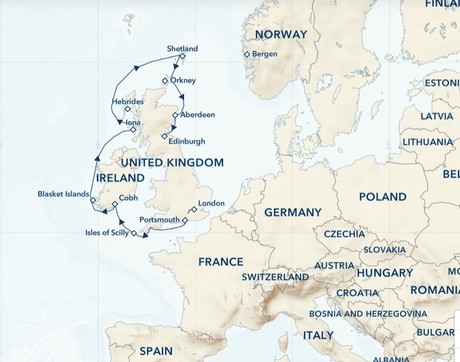Ancient Isles: England, Ireland & Scotland Cruise
Uncover the hidden side of well-known isles on a journey that encompasses Britain, Ireland, and Scotland. Enter coastal villages by Zodiac and land on remote beaches. Witness prehistory juxtaposed with the present, probe the secrets of Stone Age megaliths, and discover early Christian settlements, Navigate through a picturesque sea cave, and observe colonies of migratory seabirds. Stroll charming, remote towns and mingle with locals in cozy pubs throughout the land.
Highlights
• Trace a maritime thread around the isles, exploring the wild and beautiful places where Celtic and Viking influences still thrive in local languages and customs
• Zodiac into Staffa Island's ancient Fingal's Cave, formed entirely from hexagonal basalt columns (conditions permitting), and observe a puffin colony
• Walk along Cornwall's scenic cliffside trails, and experience the peninsula's rich history and culture with visits to local producers and country estates
• In the Inner Hebrides, see the stunning 12th-century Iona Abbey—believed to be the birthplace of Christianity in Scotland
• Explore the wild, windswept coast of Western Ireland and Scotland; search for whales, dolphins, and seals; and see vast, important seabird nesting sites
• Discover the Stone Age megaliths of the Ring of Brodgar and the 5,000-year-old village of Skara Brae on Orkney
• Extend your voyage: explore the Scottish Highlands on a post-voyage extension
Arrive in London and spend the morning in the countryside of Windsor, known for its royal heritage and grand estates. This afternoon, transfer to Portsmouth to embark on our journey around the British and Irish Isles.
Arrive in the Cornish port of Fowey (pronounced “Foy”) this afternoon. Visit the Eden Project, a collection of immense eco-garden biomes set within a 34-acre bowl—celebrating sustainability and botanical innovation. Alternatively, experience the grandeur of the Estates of Cornwall on a visit to the houses of Pencarrow and Lanhydrock. For those wishing for a more relaxed afternoon, spend time on your own in the village of Fowey or join the field staff for an expeditionary outing in the area.
Revel in flourishing subtropical beauty at Tresco Abbey Garden, planted in the 19th century around the ruins of a Benedictine abbey in the Isles of Scilly. Today, it’s matured into a priceless botanical sanctuary for thousands of exotic species from across the southern hemisphere—from Brazil to New Zealand, Myanmar to South Africa. Yet here it is, on an islet just 28 miles off the Cornwall coast.
Arrive in this colorful port city on one of the world’s largest natural harbors, intimately tied to maritime history and the great Irish Emigration. Visit the Cobh Heritage Centre and learn about the momentous events that took place here—from the 1912 departure of the Titanic to the successful rescue of passengers from the torpedoed Lusitania and the millions of Irish who departed these shores in search of a better life. Enjoy an afternoon of Irish traditions, from music to sport, with locals.
Over the next two days, enjoy the windswept landscapes of western Ireland. Be on deck as we sail past Skellig Michael, the protected Celtic Christian hermitage where beehive huts and remains of a seventh-century monastery still stand. Then, get photo tips from our National Geographic Photography Expert as we sail past the uninhabited Blasket Islands, on which you'll observe a wide array of birds including storm petrels, shearwaters, terns, gulls, and auks. Our exploration continues on land through the southern corner of Ireland with its cozy local pubs, cultural centers, and country walks.
Visit the sacred island of Iona and its 13th-century abbey, long revered as a Christian pilgrimage site and believed to be where the Book of Kells originated. Several Scottish kings, including the actual Macbeth, are buried in the royal graveyard here. Later, weather permitting, we explore uninhabited Staffa Island, famed for its perfect six-sided volcanic basalt columns and dramatic Fingal’s Cave. On Staffa, join one of our naturalists to learn about and observe a large puffin colony.
Explore the Outer Hebrides of Scotland, boasting incredible seabird colonies. Conditions permitting, we make a landing at St. Kilda, a UNESCO World Heritage site and nature preserve. Uninhabited since 1930, the traditional stone village left behind by the island’s final residents now lies in ruins. But active occupants do remain: a huge population of gannets, domesticated sheep now gone wild, puffins, and wrens.
The Shetlands are characterized by deep-seated cultural traditions and dramatic landscapes. Far north and near enough to Norway to speak Scottish with a Scandinavian accent, this 100-island archipelago has never been fully tamed by those who live here. Explore these rural islands with their mix of ponies, ruins, and windswept pastures.
Options this morning include a birdwatching trek in quest of Orkney’s remarkably varied birdlife or a walking tour of Kirkwall, Orkney’s capital and a showplace of ancient Viking history thanks to its proximity to Norway. Later, discover the Stone Age megaliths of the Ring of Brodgar and the 5,000-year-old stone slab village of Skara Brae. And step inside majestic St. Magnus Cathedral, a sandstone landmark that took three centuries to build.
Start off the day with a panoramic drive through “the Granite City” before exploring Aberdeenshire’s countryside. Choose to visit a local Highland cattle farm where you will learn about its award-winning products and practices. Or, dive into Highland traditions with a visit to the Gordon Highlanders Museum. Transfer back to the ship later this afternoon and enjoy your last evening at sea.
Disembark in Edinburgh after breakfast and transfer to the airport for your flight home. Or choose to explore the Scottish Highlands on a post-voyage extension.
All day-by-day breakdowns are a sampling of the places we intend to visit, conditions permitting.
|
Book now |
More Cabin Categories & Prices Available
Category 1. From

|
Book now |
More Cabin Categories & Prices Available
Category 1. From

Vessel Type: Luxury Expedition
Length: 108 meters
Passenger Capacity: 148 (single & twin cabins)
Built / Refurbished: 1982 / 2008
Originally constructed for Norway’s renowned Hurtigruten Coastal Express, National Geographic Explorer was a natural fit for the Lindblad Expeditions fleet thanks to her exceptional manoeuvrability, ice-strengthened hull, and purpose-built expedition design. Now fully stabilised and refitted with over five decades of exploration expertise, she is ideally suited for navigating the most remote corners of the globe—from the rugged coasts of Europe to the icy passages of the polar regions. With vast windows throughout and a Scandinavian-inspired interior, the ship invites guests to stay connected with their environment at every turn.
Aboard National Geographic Explorer, every feature is tailored to enhance discovery. From the open Bridge and observation deck to the Chart Room and mudroom for expedition gear, the ship is an authentic platform for adventure. Her recently updated suites offer comfort and understated elegance, while public spaces such as the library, Global Gallery, and multiple dining areas encourage camaraderie and relaxation. Carrying expert guides, state-of-the-art tools, and a fleet of Zodiacs and kayaks, this 148-guest ship brings guests closer to nature with all the style and substance expected of a flagship expedition vessel.








Inclusions
• All accommodations, meals, and non-alcoholic beverages aboard ships
• Use of snorkeling equipment, wet suits, and kayaks (where available)
• Services of our expert expedition team and guest speakers
• Services of a ship physician on most voyages
• Certain hotels and meals ashore as indicated in the itinerary
• Round-trip transfers based on group flights
• Shore excursions, sightseeing, entrance fees, and special access permits
• Taxes, service charges, and tips (except for ship’s crew, at our guests’ discretion)
Exclusions
• Air transportation (except when we indicated in the itinerary, as included) Extensions
• Passport, visa, and immigration fees
• Travel Protection Plan
• Special and unique excursions such as scuba diving, flightseeing, etc. (where offered)
• Alcoholic beverages (alcohol is included on select ships)
• Items of personal nature
• Phone and Internet Service
• Laundry
• Gratuity for ship’s crew, at our guests’ discretion (crew tips are included on select ships)
Our Associates Include














